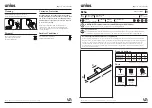
61
V
alue
S
erieS
V-710DM M
anual
1. Remove the three pot leads from the drive board; orange, red, and white.
2. Using an ohmmeter, measure between the orange and white leads for approximate
-
ly 5k ohms. If approximately 5k ohms are not measured, replace user speed control.
3. Turn user speed control pot (1050-11-37) fully clockwise.
4. Measure between the red and orange leads for approximately 5k ohms. If approxi
-
mately 5k ohms are not measured, replace user speed control.
5. Keeping the ohmmeter leads connected to the red and orange leads, slowly turn
the user speed control counterclockwise. Your meter should indicate a continuous
reduction of the ohm value across its entire range to less than 100 ohms. If not,
replace the user speed control assembly.
6. Next measure between the red and white leads. You should measure approximately
5k ohms with the user speed control set fully counterclockwise. If not, replace user
speed control assembly.
7. Keeping the ohmmeter leads connected to the red and white leads, slowly turn the
user speed control clockwise. Your meter should indicate a continuous reduction of
the ohm value across its entire range to less than 100 ohms. If not, replace the user
speed control assembly.
1. Verify motor integrity, and re-install in feeder if necessary. See section titled “Testing
the motor.”
2. Disconnect red motor wire from relay 115V (535-00-453), or 230V (535-00-457)
contact common terminal number 6, and connect this wire to the motor drive board
(44-642-025) terminal labeled - Arm.
3. Remove violet wire from the motor drive inhibit pin. Prevent this wire from touching
anything. Cover its terminal with electrician’s tape if necessary.
4. Verify user speed control integrity (see section titled “Testing the user speed control
assembly”) and turn control fully clockwise.
5. Set all four dials to their respective positions as shown in the electrical wiring dia
-
gram; Min, Max, IR Comp, and Cur Lim. (If your feeder operates on 230V power, set
your Max dial to the 10 o’clock position instead of the 6 o’clock position as viewed
on the diagram).
6. Turn feeder power on and verify AC power has been applied to terminals labeled L1
and Neutral (L2). Does the motor run?
a. Yes: The drive tests good. See section titled “DC motor drive board setup pro-
cedure.”
b. No: Replace DC motor drive board and see section titled “DC motor drive
board setup procedure.”
Testing the user speed
control assembly
Testing DC motor drive
Exercise care when per-
forming the following test.
Bodily contact with 115VAC or
230VAC can result in serious
injury or death.
Testing DC motor drive
(continued)
Problem
Solution
Table 9-1.
Quick-Look Troubleshooting (continued)
Summary of Contents for Streamfeeder V-710DM
Page 1: ...Manual Value Series V 710DM ...
Page 7: ...v Value Series V 710DM Manual ...
Page 47: ...40 Value Series V 710DM Manual 7 Mechanical Components BASE FEATURES ...
Page 49: ...42 Value Series V 710DM Manual BASE FEATURES ...
Page 51: ...44 Value Series V 710DM Manual CARRIAGE ASSEMBLY Assembly 10501102 ...
Page 55: ...48 Value Series V 710DM Manual HOLD DOWN ASSEMBLY Assembly 10501109 ...
Page 57: ...50 Value Series V 710DM Manual GATE PLATE ASSEMBLY Assembly 84111006 ...
Page 59: ...52 Value Series V 710DM Manual TRIANGLE WEDGE ASSEMBLY Assembly 63311018 ...
Page 61: ...54 Value Series V 710DM Manual 8 Electrical Components ...
Page 62: ...55 Value Series V 710DM Manual ...
Page 63: ...56 Value Series V 710DM Manual ...
Page 64: ...57 Value Series V 710DM Manual ...
Page 71: ...64 Value Series V 710DM Manual ...
Page 72: ......






































